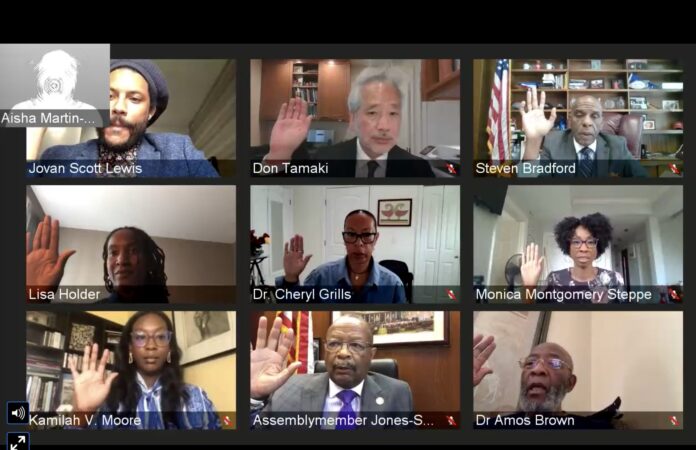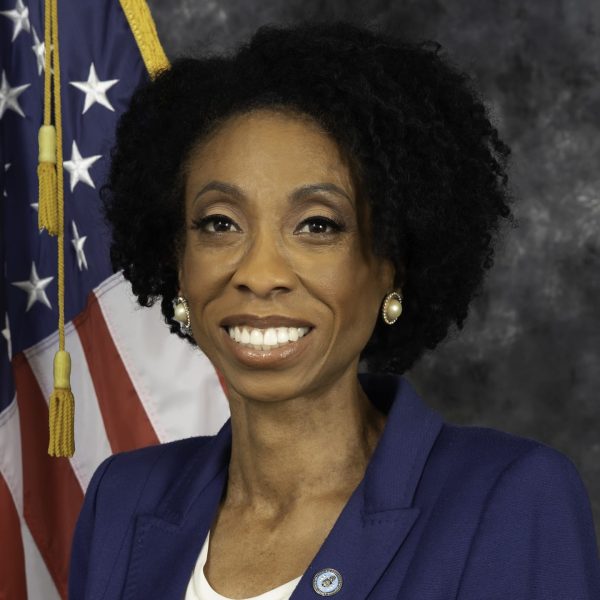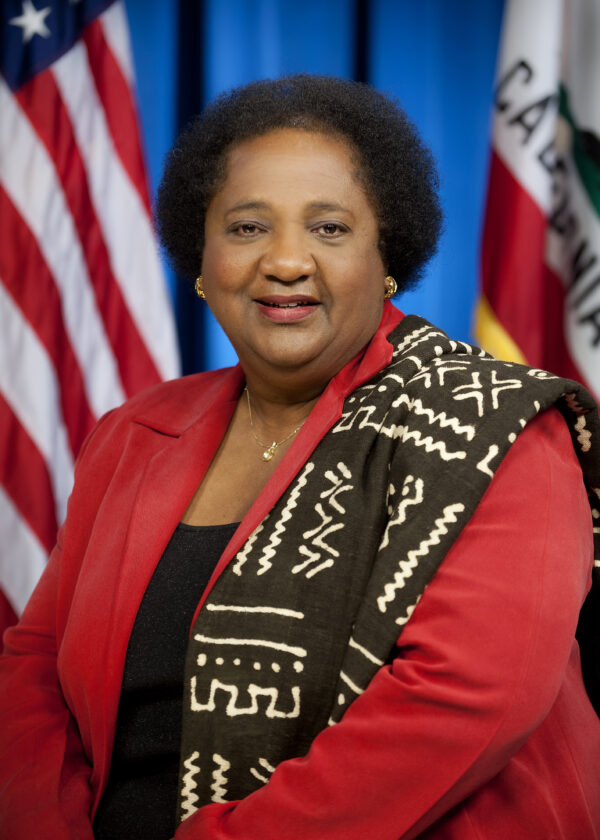
By Bo Tefu | California Black Media & San Diego Voice & Viewpoint Newswire
The California Task Force to Study and Develop Reparation Proposals for African Americans hosted its first public meeting June 1.
The virtual gathering marked the official launch of the first-in-the-nation initiative organized to investigate how a state engaged in and benefitted from slavery, and how it practiced or condoned racial discrimination, excluding African Americans from economic and other opportunities.
San Diego City Councilmember Monica Montgomery Steppe took the oath of office for the Task Force to Study and Develop Reparations Proposals for African Americans. The Task Force was created by AB 3121, passed by Secretary of State Dr. Shirley Weber when she served in the Assembly. Members are charged with the duty to identify, compile, and synthesize the relevant evidence and documentation of the institution of slavery that existed within the United States and the colonies. AB 3121 requires the Task Force to recommend the form of compensation that should be awarded, how it should be awarded, and who should be eligible for the compensation.

“It is a heavy honor to do this work,” said Montgomery Steppe. “We must face our history head on if we are to move toward a more just world. The fact is African Americans and other enslaved populations, like Native Americans in California, built our country for free—and then were locked out of all the economic benefits of their labor for generations. We cannot erase that damage, but we can work to ensure it doesn’t hold back future generations. We must measure the impact of this systemic racism on generational wealth and economic opportunity so we can make educated decisions on how to correct it moving forward.”
During the meeting, that lasted over four hours, the 9-member task force elected Kamilah V. Moore, a Los Angeles-based activist and attorney, as its chair. The group also elected Dr. Amos Brown, pastor of Third Baptist Church in San Francisco and president of the San Francisco NAACP branch, as vice chair.
The newly elected leaders represent an inter-generational team, bridging the millennial and baby boomer generations, which are known for their often-conflicting worldviews.
Moore, who passed the California bar examination in January, intends to use her studies in domestic and international human rights to provide perspective on, “how the recommendations comport with international standards of remedy for wrongful injuries caused by the state, that includes all reparations and special members measures as understood by various international protocols laws and findings,” she said.
In her term as chairperson, Moore says she will provide expertise on, “how the state of California will offer a formal apology on behalf of the people of California for the perpetuation of gross human rights violations and crimes against humanity against Black Americans who descend from chattel slavery in the United States.”
A history buff and student of Dr. Martin Luther King, Jr., civil rights veteran Brown has dedicated more than six decades of his life to fighting for racial justice and equality.
“I’m concerned about our people and making sure that we stay on point in terms of delivering the sons and daughters of Africa what belongs to them,” said Brown.
The task force will be collaborating with the California Department of Justice to conduct research and provide recommendations for compensation based on the requirements of Assembly Bill 3121, the legislation that paved the way to set up the task force.
The reparations task force will work with renowned researchers and scholars to both quantify and qualify the damage slavery had on African Americans in California. The collaborators will conduct extensive research to examine the economic, educational, and social injustices suffered by descendants of enslaved Black people in the United States.
Coauthors of the book, ‘From Here to Equality: Reparations for Black Americans in the 21st Century,’ Kirsten Mullen and William A. Darity, Jr., will provide general guidance for ways the state needs to implement reparations.
History professor Stacy Smith will offer expertise on the impact of slavery specific to California and how racial injustices affected the descendants of enslaved Africans.
African Studies professor Marne Campbell will lead a research team that includes students at Loyola Marymount University to compile a report on various federal and state laws, regulations, policies, and practices that discriminate against African Americans.

“We must be aggressive in our efforts, be honest and direct, and figure out what we need to do in California, and be an example to the rest of the nation,” said California Secretary of State Shirley Weber, who authored the bill when she was an Assemblymember representing the 79th District in the San Diego area.
Weber said that the inaugural meeting is a historic moment that is 400 years overdue for African Americans.
“It’s time for folks to acknowledge the harm that’s been done, the harm that continues to be done,” said Weber.
“We are here today because the racism of slavery birthed an unjust system and a legacy of racial harm and inequality that continues today in every aspect of our lives,” she said.
“We are here today not just to seek an answer to say, ‘Was there harm?’ But your task is to determine the depth of the harm, and the ways in which we are to repair that harm,” Weber said to the task force.
Besides Brown, Moore, and Montgomery Steppe, other task force members are state Sen. Steven Bradford (D-Gardena); Assemblymember Reggie Jones-Sawyer (D-Gardena); Cheryl Grills, a clinical psychologist; Lisa Holder, a racial and social justice attorney; Jovan Lewis, a social scientist who focuses on racial and economic disparities; and Donald Tamaki, an attorney who worked on the landmark case that won reparations for Japanese internment camp victims.
The task force is scheduled to host a follow-up public meeting in July to finalize the scope of their study — and how they will move the reparations conversation forward in California.



